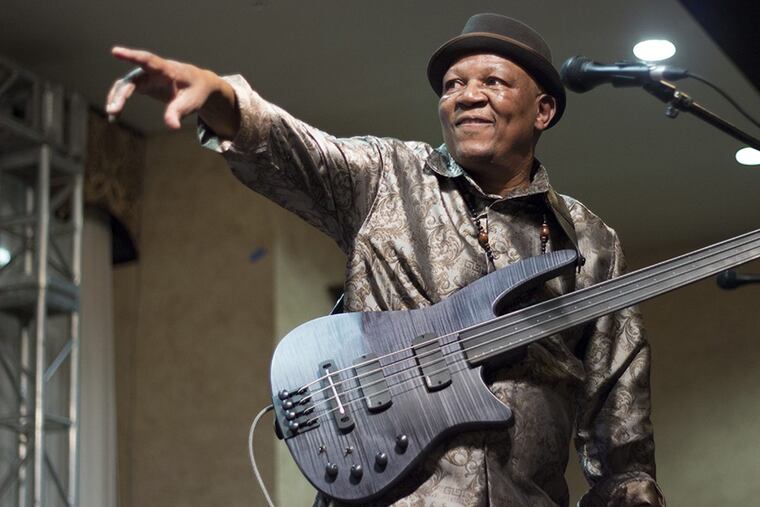Philly singer recruits 'Graceland' bassist to pay tribute to Paul Simon's beloved album
The South African bassist on why "Graceland" was made for the moment.

When Ardmore Music Hall and Philadelphia crooner Ryan Tennis pay tribute to Paul Simon's abstractly poetic, South African-inspired album Graceland this weekend, they'll get straight to the heart of the music with Bakithi Kumalo, the Soweto-born bassist who played on Simon's masterwork.
Kumalo, who cocreated Graceland's nuanced rhythmic dance and breathy fretless pulse, got his green card with Simon's aid — he now lives in Bethlehem, Pa. — and has collaborated frequently with Simon, including on albums such as So Beautiful or So What and Stranger to Stranger.
At Saturday's show, Tennis and Kumalo will perform all of Graceland. Other local artists, including Jon Francis, will cover other Simon songs.
"I met Bakithi at 2015's Philly Folk Festival, where we performed an early iteration of this Graceland tribute," says Tennis. "I was [only] slated to sing 'Diamonds on the Soles of Her Shoes,' but the other artists couldn't get to the stage in time, and since I knew all Graceland songs like the back of my hand, I filled in [for the rest of the album]." After the festival, Tennis spoke with Kumalo about developing their take on Graceland. "He was all about it. The South African styles of Graceland are some of the most carefree, joyful rhythms and melodies of all time, even though they were born out of a time of great strife and injustice in that country."
Kumalo came from a musical family. His mother was a singer, and he began playing bass with his saxophonist uncle's band at age 7. When he writes songs, he often puts the notion of the bass aside. "I like to focus on the saxophone and think of my uncle," he says. He gravitated to the fretless bass because at the shop where he took lessons, "no one played it," he said with a laugh. "If I damaged it, it didn't matter. I got stuck with it. It was $100 in 1972. My mother gave me the money. This is before I knew about Jaco Pastorious and Weather Report records. Then I was really hooked."
A sound formed in his head, a breathy one that became what he likes to think of "as an energy, this sweet beautiful tone," he said. "I am more rhythm than harmony. But both are within my sound. There is a lot of thinking to what I do."
Kumalo listens for how much space he must leave for other musicians during every session and considers all other parts and instrumentation as though he wrote the song. "It is a big responsibility as a bass player to make a song sound as if it was born to be exactly like it sounds when you hear it," he says. "Plus, every project is different. Mickey Hart and Randy Brecker, with whom I recorded, offered complexity and density for me to find my way through. Laurie Anderson had more openness. I can adjust to anything, however."
Nothing makes Kumalo quite as ruminative and nostalgic as recalling his meetings with Simon, and the impact Graceland had on his life and the lives of all its listeners. He calls the 1986 album "good music interestingly executed," and ponders the sociology of its moment, during the antiapartheid movement driven by Nelson Mandela.
"Looking back, I think about the politics of it all. The timing was perfect. Graceland was supposed to be born then," he says.
At the time, Kumalo was working as a mechanic and "wondering if the bass would take me away from all of that." He didn't know who Simon was when the New Yorker arrived at the studio in Soweto. All he derived from the sessions at first was how much Simon liked to jam. "And that he was going crazy over the fretless," he says with a laugh. "That was my real opportunity — that I could do what other bassists did not do. And perhaps that would finally take me out of this country. Plus, I think Paul really liked me because other musicians would clock out when their time was over. I always stayed until he got what he wanted. And then I stayed some more. Paul told me during the Graceland sessions that through his life and career, it is the bass that truly guides him. Man, from there on, I really stayed focused."
When Simon realized he had to finish Graceland in New York City, he told Kumalo he would have to get him his travel papers, which changed his life. "I could not believe it. Everything was transformed. I called my boss — the guy who originally directed me to Paul Simon in the first place — and thanked him for everything. That was the start of a great journey."